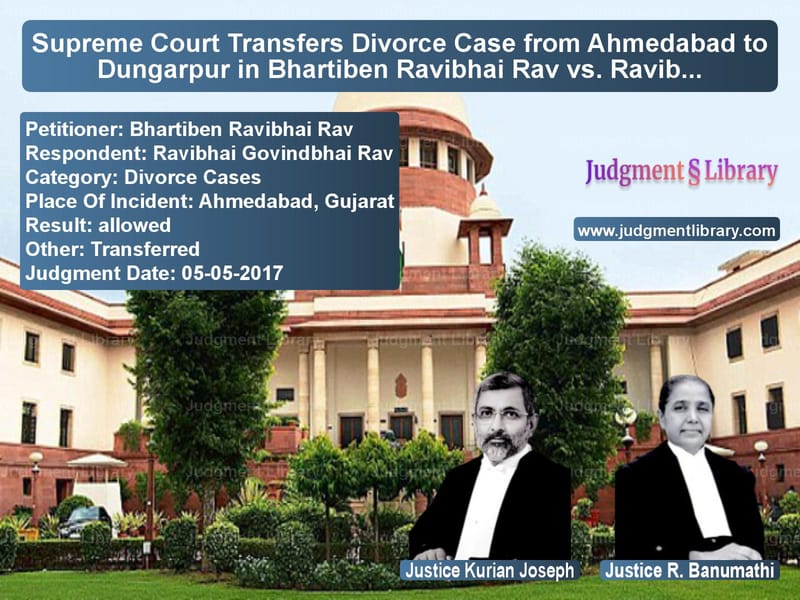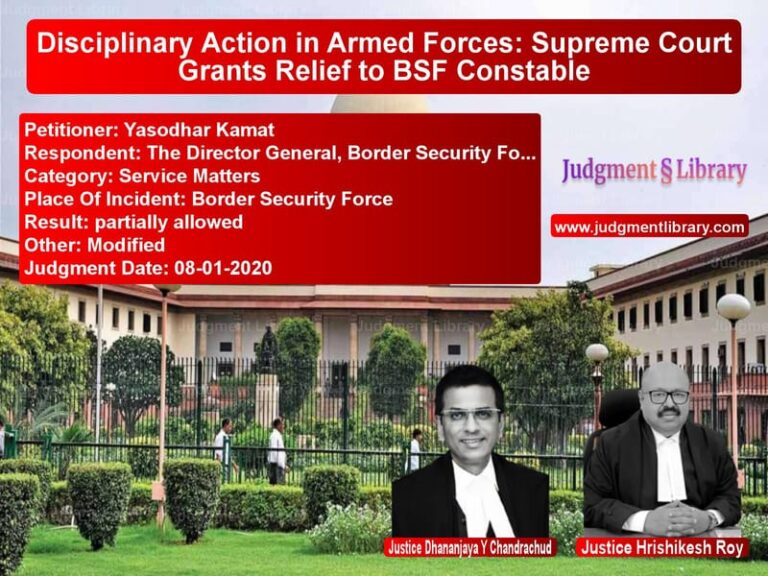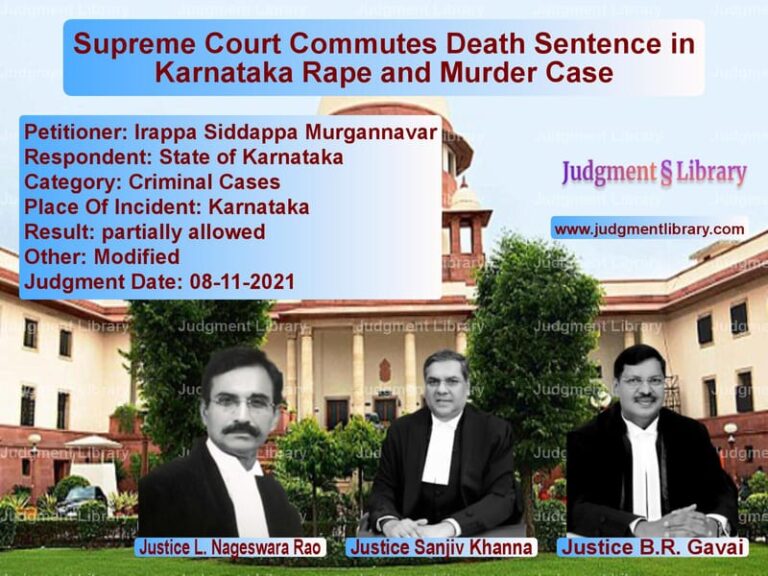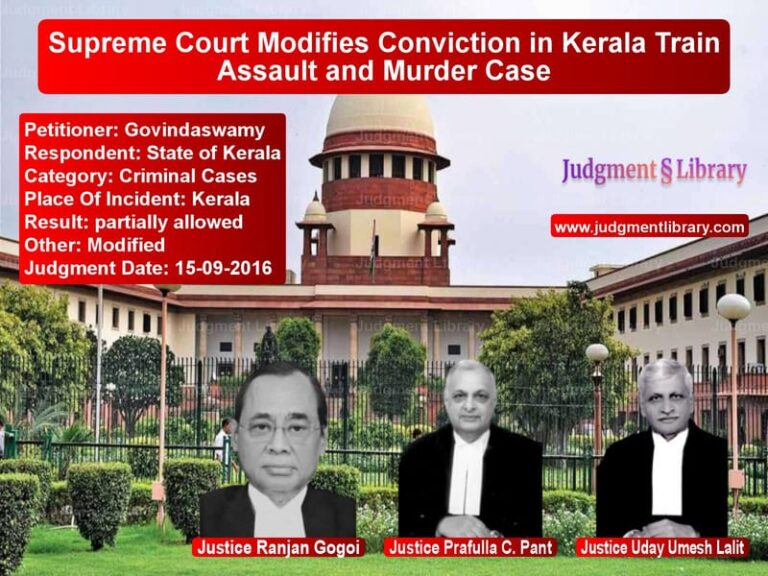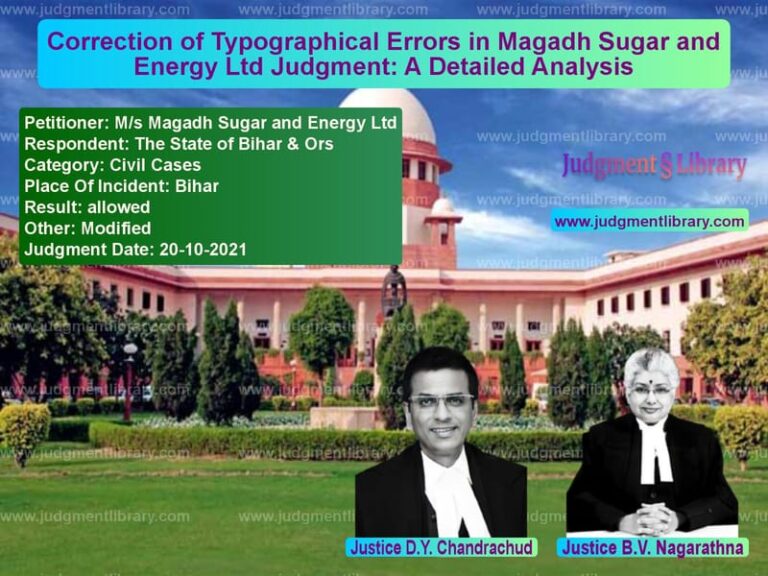Supreme Court Transfers Divorce Case from Ahmedabad to Dungarpur in Bhartiben Ravibhai Rav vs. Ravibhai Govindbhai Rav
The case of Bhartiben Ravibhai Rav vs. Ravibhai Govindbhai Rav involves a Transfer Petition filed under Section 25 of the Civil Procedure Code. The petitioner, Bhartiben Ravibhai Rav, sought the transfer of a divorce case from the Family Court in Ahmedabad, Gujarat, to a competent court in Dungarpur, Rajasthan, citing difficulties in travel and language barriers.
Background of the Case
The petitioner and the respondent were married on February 19, 2006. They had two children—Meshvasinh and Aeshvasinh—who were aged eight and seven years, respectively, at the time of the petition.
The marriage faced difficulties, and in September 2015, the petitioner alleged that she was thrown out of her matrimonial home. Following this, the respondent-husband filed a divorce petition, H.M.P. No. 1668 of 2015, before the Family Court, Ahmedabad, under Section 13(1) of the Hindu Marriage Act, 1955. The petitioner-wife sought the transfer of the case to Dungarpur, Rajasthan.
Legal Issues Involved
1. Whether the divorce case should be transferred based on the wife’s plea of inconvenience.
The petitioner claimed that traveling from Dungarpur to Ahmedabad was difficult for her, considering the 200 km distance.
2. Whether multiple cases pending in Dungarpur justified the transfer.
The petitioner had already filed several other cases in Dungarpur, Rajasthan, against the respondent:
- An FIR under Sections 498A and 406 IPC and Section 4 of the Dowry Prohibition Act.
- A petition under Section 125 Cr.P.C. for maintenance before the Family Court, Dungarpur.
- A case under Sections 12 and 23 of the Protection of Women from Domestic Violence Act, 2005, before the Chief Judicial Magistrate, Dungarpur.
3. Whether the respondent would face any hardship due to the transfer.
The respondent opposed the transfer, arguing that he was employed in Ahmedabad and had to take care of their children and elderly parents.
Arguments Presented
Petitioner’s (Bhartiben Ravibhai Rav) Arguments
- Traveling to Ahmedabad was difficult due to the distance of 200 km.
- She was not well-acquainted with Gujarati, making it challenging to contest the case in Ahmedabad.
- Since multiple legal proceedings were already ongoing in Dungarpur, it was convenient for both parties to have the divorce case transferred there.
Respondent’s (Ravibhai Govindbhai Rav) Arguments
- The respondent was employed in Ahmedabad and had to care for their two minor children and his elderly parents.
- He was already appearing before the courts in Dungarpur in relation to the other cases filed by the petitioner.
- He objected to the transfer on the ground that the divorce case should be heard where it was originally filed.
Supreme Court’s Key Observations
The Supreme Court made the following key observations:
- The petitioner had genuine difficulty in traveling to Ahmedabad, considering the distance and language barrier.
- Since multiple cases were already pending in Dungarpur, transferring the divorce case there would serve the interest of justice.
- The respondent was already attending hearings in Dungarpur, which meant it would not be difficult for him to pursue the divorce petition in the same city.
Final Verdict
The Supreme Court allowed the transfer petition and directed the Family Court in Ahmedabad to transmit all records to the District Judge in Dungarpur, Rajasthan, who would then forward the case to the appropriate Family Court in Dungarpur.
Additional Directives
- The Court clarified that it had not expressed any opinion on the merits of the divorce case.
- If needed, sufficient security should be provided to either party upon application before the court.
Significance of the Judgment
This ruling sets an important precedent for transfer petitions in matrimonial disputes:
- The Court reaffirmed that in matrimonial disputes, the wife’s convenience is often given preference, particularly when multiple cases are pending in one location.
- The decision underscores that language barriers can be a valid reason for seeking a transfer.
- It also confirms that when one party is already appearing before a court in a different location, it becomes easier to justify a transfer to that location.
Conclusion
The Supreme Court’s ruling in Bhartiben Ravibhai Rav vs. Ravibhai Govindbhai Rav highlights the importance of ensuring fair access to legal proceedings in matrimonial disputes. By granting the transfer, the Court aimed to reduce hardship on the petitioner while ensuring that the respondent’s rights were not unduly affected.
Don’t miss out on the full details! Download the complete judgment in PDF format below and gain valuable insights instantly!
Download Judgment: Bhartiben Ravibhai R vs Ravibhai Govindbhai Supreme Court of India Judgment Dated 05-05-2017.pdf
Direct Downlaod Judgment: Direct downlaod this Judgment
See all petitions in Mutual Consent Divorce
See all petitions in Judgment by Kurian Joseph
See all petitions in Judgment by R. Banumathi
See all petitions in allowed
See all petitions in Transferred
See all petitions in supreme court of India judgments May 2017
See all petitions in 2017 judgments
See all posts in Divorce Cases Category
See all allowed petitions in Divorce Cases Category
See all Dismissed petitions in Divorce Cases Category
See all partially allowed petitions in Divorce Cases Category

